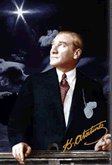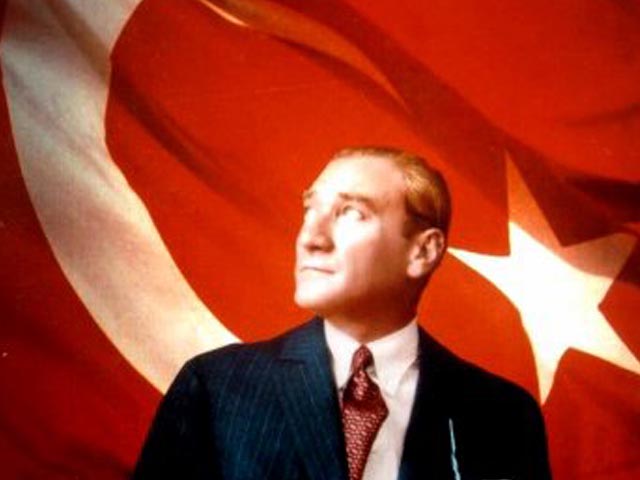
This month the Turkish nation commemorates the 71st anniversary of Ataturk’s passing. On this occasion, rather than lamenting his loss let us take stock of where we stand and how we have fared in following his steps.
Ataturk’s emergence was not accidental created by the circumstances of a one-time event like a spark and then buried in history in oblivion; rather, it is Providential. His accomplishments are an epic story of an independence movement led by a national hero. Long before the Independence War, in 1902, while he was still in the War Academy, Ataturk was obsessed with a sacred mission that germinated in his mind ever since. His vision was to liberate the country from the decayed regime of the sultan, to save the people from further humiliation and injustice of a corrupt dynasty, and then to put a masterly-crafted end to all the abuse they visited upon their own people for centuries.
By invading the country, the imperialist powers themselves precipitated the Independence War. The crippled Ottoman Empire was not in a state to challenge the victorious powers. At that time Ataturk came on the scene as the only trustworthy leader, anointed and inspiring, to lead the beaten and exhausted nation to its salvation. The people believed in him and rallied behind him in a hellish war. Much as a miraculous achievement, Ataturk’s military success is only a chapter in his epic journey. He was a warrior, yet a noble peace-maker, he appreciated the great merit of peace and steered his nation in that direction. His inspiring success placed him in the galaxy of the immortals whom the future generations will look upon with awe.
Ataturk’s World view was Darwinesque. He believed that the survival of a nation depended on its adaptation to rationalism, not on religious dogmas and superstitions that create a static mind far from vibrancy. The societies should adapt themselves to ever-changing circumstances, and be conscious of their social and technological environment. His goals were unfailing but his tactics flexible. He was a renaissance man and created a cultural renaissance in Turkey during his relatively short tenure.
Ataturk was aware that his reforms could not have been realized within a lifetime, thus he laid their success in the hands of the future generations. In his famous speech to the Turkish Youth, he charged them with the preservation of the foundations of the Republic and the furtherance of his reforms as the reforms could survive only with freedom under a republican regime. A theocratic, backward country is not a healthy medium for reforms. In fact, the timid attempts for changes in the Ottoman Empire had been undertaken in 1839, 1856 and 1908, yet, all failed.
Ataturk envisioned two main pillars for his Trust: The military and the Youth. He assigned to the military the survival of the nation founded on the Republic and the independence, he so gloriously instituted. The Youth was trusted with the other pillar, the guardianship of the reforms that Ataturk so skillfully initiated.
In this mission, the Youth need to live up to the expectations of Ataturk, and not to fail him. As such, the Youth have a moral obligation to history, to the Turkish nation, and to themselves. Ataturk envisioned a forward-looking, rational-thinking, progressive Youth with new and fresh ideas coming from fresh minds.
Yet, at times, when Ataturk’s reforms were not pursued or even compromised by the successive Turkish administrations that succeeded him the youth was “missing in action” without any reaction. In the absence of ideological guidance, the Youth at times seems to have lost its bearings, and pursue wrong ideas and alien ideologies, like Mao’ism, Leninism, Khomeinism. In the 1970s, the wide-spread terrorism caused by the division between the Leftist and the Rightist youth groups ravaged the entire country for a decade. It was such a waste of time and squandering away human resources. On that occasion, in a commendable move, the Armed Forces assumed the role of guardianship, lived up to Ataturk’s ideals, and rushed to the rescue of the Constitution. Are the Youth inflicted with shallowness, or burdened with lethargy, or lost its compass? Or, can it not identify with the spirit and purposes of the reforms because they were simply handed down to them in a silver tray by Ataturk?
Another phenomenon that may have estranged the Youth from the Ataturk’s reforms are the unstable governments, constant political bickering, frail democracy and pettiness. In this chaos religion easily moves in and fills the vacuum. Under the sway of political Islam, the Youth is being indoctrinated to view the reforms as anti-Islam, and the populace in Turkey seem to identify all the more closely with Ottomanism. The Turkish people were fully behind the Independence War against the imperialist powers, yet the fight against the corrupt and cowardly sultan was not a popular movement unlike the French and Russian revolutions; it was conceived, led and won by one man, Ataturk. Although the Turks won their freedom with blood, sacrifice and courage, being for centuries devoid of national identity, the wide-spread propaganda machine of the reactionaries has made the Turks believe that they had not sought the reforms themselves, they were imposed on them from above by Ataturk!
The Turkish Youth must come of age, redefine themselves and become a civil power. They must stop being a spectator on the sideline in the evolution of society. No doubt, they do not want to live in a backward, theocratic, autocratic country with continued technological and economic dependence on the advanced nations. It is unimaginable that they would ever want to go back when they have plenty of reasons and adequate foundation to go forward. They have to pick up the banner passed on to them by Ataturk and run into the future before the banner collects more dust.
******
AYHAN OZER

